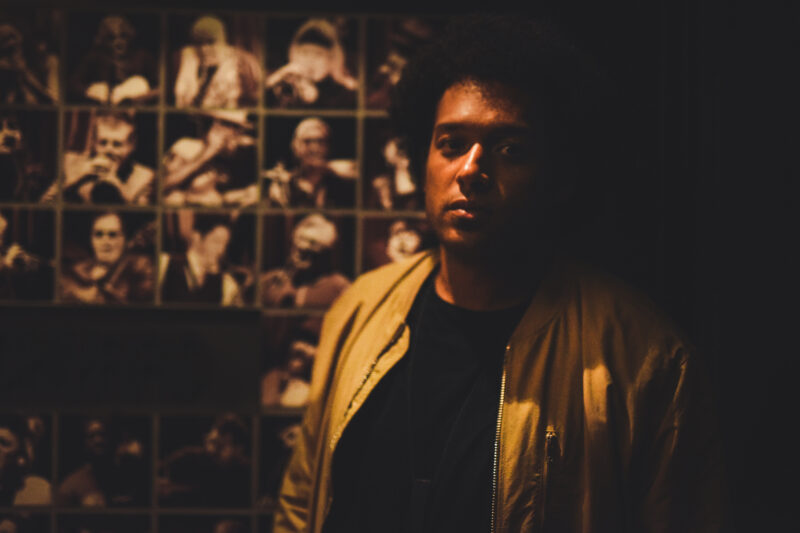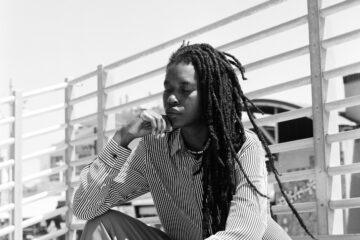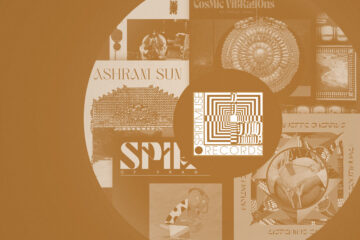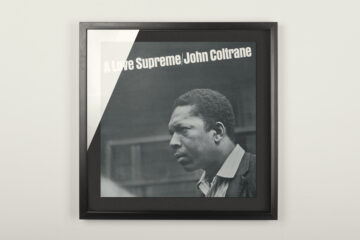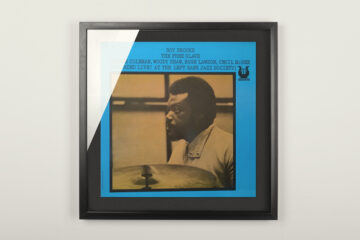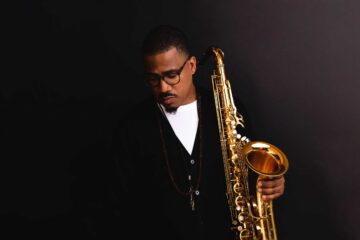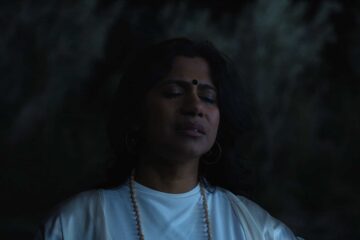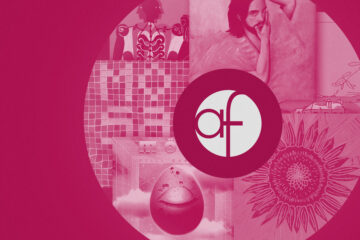These are stormy times in the States: Black Lives Matter and Corona-death-tolls, the upcoming election, President Trump – and children romping in the background. While elsewhere, journalists’ questions are answered listlessly on the computer by e-mail, Makaya McCraven sits down and speaks very thoughtfully and passionately about the answers to our questions. And what at first glimpse seems to be a crazy beat quickly turns out to be a child’s toast. »Sorry for the noise«, he apologises, although this would not have been necessary. He was nevertheless very understandable. And it’s a special thing that someone like McCraven still takes the trouble not to make use of stencil-like, pre-formulated answers, but takes a lot of time for each question. He certainly wouldn’t need it anymore, because Makaya McCraven is one of a group of jazz musicians worldwide who are so much in demand that they could probably play a studio session and another concert every day. Since he sent out a status-report of the two flourishing jazz scenes to the world in 2018 with ›Where We Come From‹, the London meets Chicago mixtape, he is considered a superstar of the scene and beyond. The success was laid in his cradle: His mother, Ágnes Zsigmondi, a well-known Hungarian chanson singer, his father, Stephen, played with Archie Shepp, with Yusef Lateef, with Harold Ashby. They met regularly in Amherst, Massachussets, where they all taught music at the university. Now Makaya himself is one of the greats – besides Kamasi Washington – he is probably the most prominent voice of the jazz hype. Although he is a drummer, i.e. an instrumentalist, his great gift seems to lie more in the sampling composition of hip-hop. So these days a B-side addendum to the album ›Universal Beings‹, the so-called ›E & F Sides‹, is being released. Here, the voices and instruments of such distinguished musicians as Shabakha Hutchings and Nubya Garcia become beats and micro-compositions, which develop a trance-like nature through repetition and looping.
What does it mean to be a »universal being«? Is universality something you aspire to do with your music? Do you think that it is possible to listen to music apart from socialization and cultural influences?
Makaya McCraven: Being a »universal being« is more about recognizing a thread, that connects all the people despite of differences. Regardless of the vantage point and how we are socialized, we are operating within one broad platform. I do not believe, that you can separate yourself completely and put yourself in a vaccum, when it comes to how you consume art, how it affects you and even when you produce art. But I think for me the greatest art has always some vulnerability, coming from the depth of feeling.
On the other hand, you really benefited from your family background. Your father was a famous jazz musician, your mother a Hungarian folk-singer. It is easy to see your career closely related to that of your father; but what did you take away from your mother and her musical career and her style?
It is right, that focusing on the music of my father is not the whole story. My mother was very influential for me. Technically speaking: My interest in odd-meter music, 7/8, 11/8, multi-meter, come from folk music in general. Not only eastern european folk, or pan-african. But hungarian, bulgarian, gipsy-music was something I studied deeply. I’m interested in this type of music that is passed on through culture, from person to person. That influenced my aesthetic heavily.
Due to your father’s career, you have been in contact to some of the greatest jazz musicians, how has this been reflected your understanding of jazz and music in general? What did this contact and proximity teach you?
I feel very lucky in a lot of ways. Being up close and personal with innovators of music and people of this status, showed me a path how to be creative. That is really something I took away from this. Often we look on jazz in reverence of the elders, in imitation; what I got from these guys was being original and to develope my own sound. It also showed my what it means to be a musician and an artist – with all the ups and downs. That helps being not desillusioned, that it talks a long way to live such a lifestyle.
Over the last decade, jazz has changed in very significant ways. What do you think are the biggest differences between the generation of your father and the young and new artists in Chicago, London and Berlin?
I think the landscape is different than in former times: the industry, festivals etc. Everything has changed. When I started coming up it was different in terms of what is possible. One of the big differences today really has to do with young musicians embrace technology and current music. Not only the musicians embrace of it, but we also see, what is most noticeable is the change in attitude of the fans and people being open to HEAR. There is a demand for depth in music. And now there are people wanting more than just mainstream.
»There is a demand for depth in music. And now there are people wanting more than just mainstream.«
Makaya McCraven
Even though Chicago has a rich and prominent tradition, it always seems to be in the shadow of New York and LA, especially internationally. What are the most common misunderstandings and misconceptions about Chicago’s music scene?
I think Chicago has the »second-city-syndrome«. Chicago is more of a working class type of place; it doesn’t have this amount of »flash and shine« as those other cities. You gotta come real, gotta come correct, for people to give you respect it is sometimes a tough place in a lot of ways. On the other hand it has this great communal and supportive scene. One misconception is that people don’t see the broad diversity of music that lives in the city. People think of the blues, of the AACM and avantgarde movements, but there is a ton of wonderful musicians. I learned a lot here. There is still this misunderstanding, that Chicago is only these traditions that we know it for.
Your own musical approach seems to link different styles, genres, histories – from the Stones Throw-instrumental-hiphop-sounds, which originated in Detroit, to the free jazz-experiments in New York City; for the Universal Beings-record(s) you travelled to London and the cities mentioned above. What does it mean to you to experience the world, the different scenes?
I kinda grew up in a way, that I was connected to different cities. When I moved to Chicago, there was a lot of talk in the city about the city, about Chicago itself. My view was a little bit bigger than that. I never felt like having a home town or only one place that defined me. Travelling is a way to open the mind: Meeting people that challenge our own expectations and ways of thinking. My musical career was always about playing with as many different musicians as I can. And learn from them. The beautiful thing is that if you travel, you are rewarded with so many wonderful experiences and relationships. I think we would be able to tread each other better if we had more connectivity.
What does pastiche, remix and sampling mean to you? What happens while you are cutting and slicing the tracks? Are you trying to free jazz music from restraints?
Sampling means for me to take given sounds and reconceptualize them. I feel like the records that I’m making, I don’t consider them as a remix. I take fragments and pieces and collaging them together – I’ve been called a beat-scientist. I think of me as a beat-archeologist, where I’m excavating sounds. Cutting and slicing is for me the art of following the process and learning what I want to make. Via trial and error. As I studied hip-hop-music I learned that there a things you can’t do with instruments. I’m not trying to free jazz from anything. I don’t need to do anything for the music; I just try to do the best music I can do. I don’t even know if I would call my music jazz. It’s a suitable term to accurately describe what I do, but maybe it is not needed to label it that way.
Do you think it’s a coincidence that the rise of jazz scenes in Chicago and London happens simultaneously with the BLM-movement and a growing demand of Black stories and voices? Or do you think that both come from the same well, the same source?
That’s not a coincidence. I wouldn’t frame it so deductively. I’m looking at young people creating and consuming music, they are just a part of THIS generation. They are the same people. The art reflects what is going on in the world, as well as projects a future that artists are envisioning. Art is past, present and future. It is surely not happening in a vacuum and music is life.


